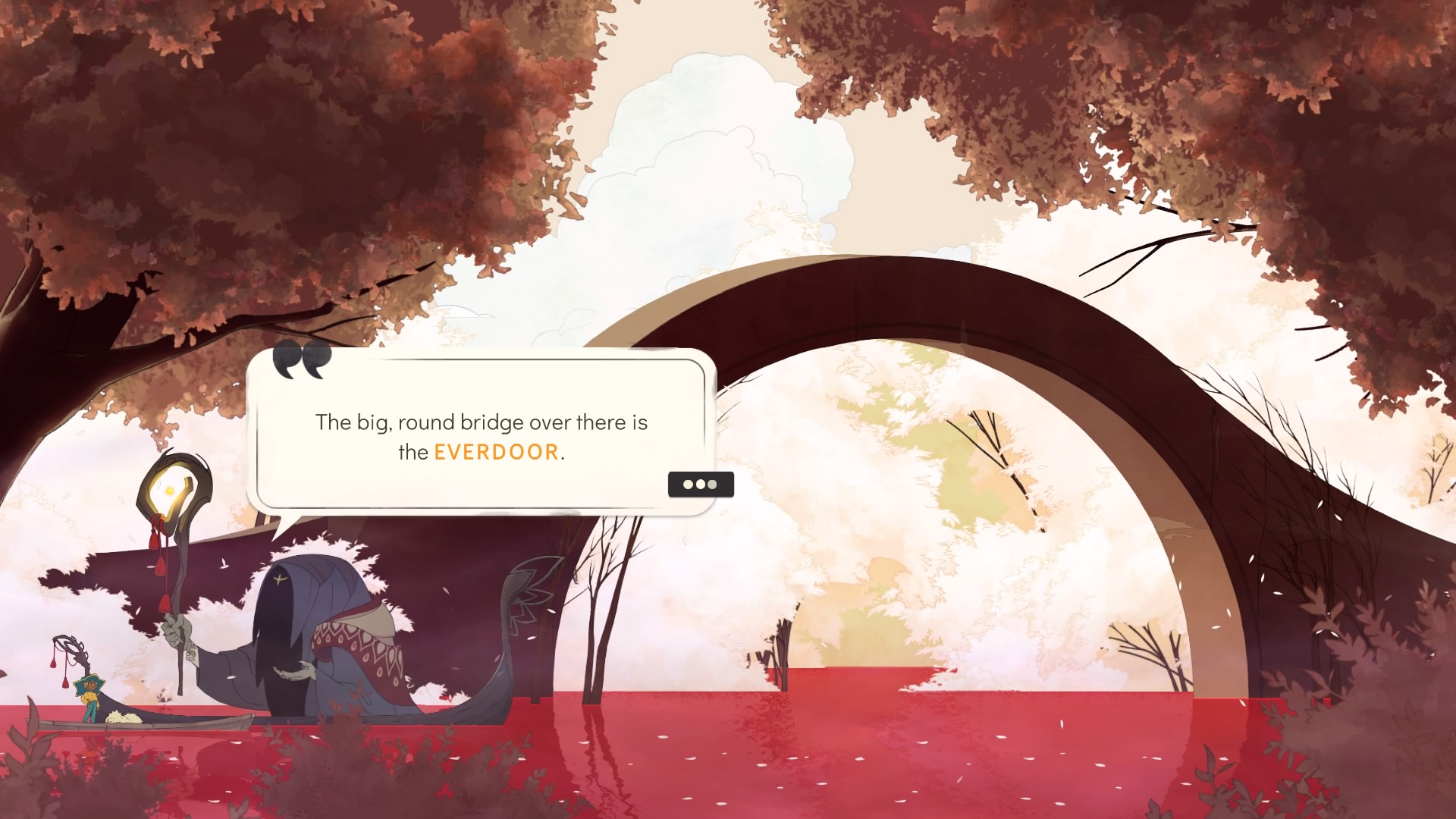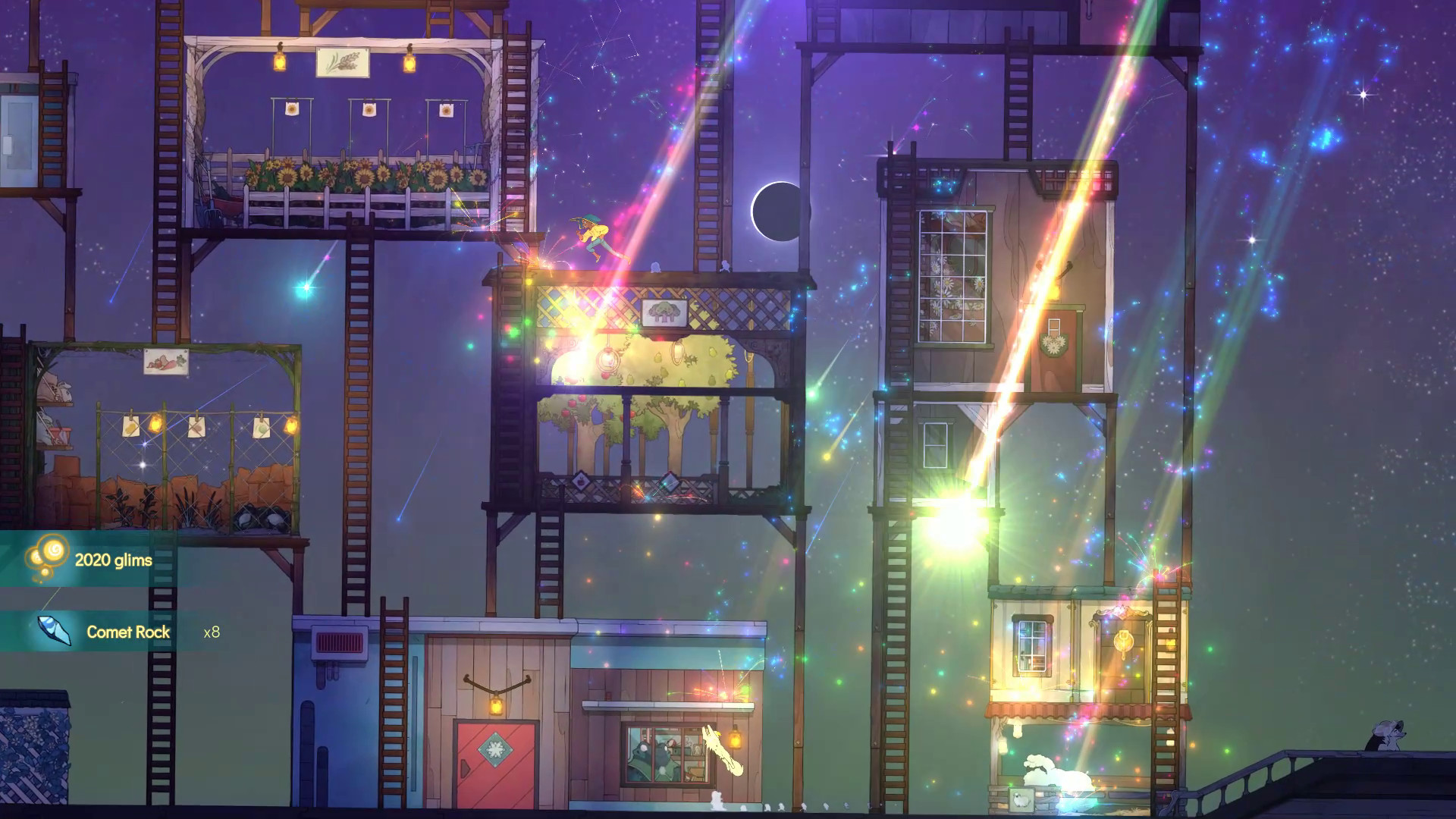Platforms:
Xbox One, PS4, PC, Nintendo Switch
Released:
August 18, 2020
Publisher:
Thunder Lotus Games
Developer:
Thunder Lotus Games
Content Warning: Spiritfarer, and by extension this review, deals heavily on the topic of death and the loss of loved ones. Please take care of your well-being when both reading this review, and trying out this game.
Spiritfarer has an aura to it that for the life of me I can’t quite pin down. I felt it as soon as I watched the game’s first trailer many months ago. The simple phrase “Learn how to say goodbye” appearing before footage of a character doing just that. All this emotion on behalf of characters I hadn’t even met yet. I felt it during the game’s introduction, simply from being told about my role as the Spiritfarer. Both of these were enough to make me feel that characteristic burning of welling-up tears starting to sting at my eyes. Unsurprisingly, as you meet these characters and learn their stories, it doesn’t get any less affecting.

The first thing I want to say about Spiritfarer is that you should be ready for it, as I tried to make clear with that content warning up the top there. I felt a significant amount of apprehension for the whole day before I first began this game. When I announced the premise to my stream, a number of people immediately vocally excused themselves. Something about Spiritfarer hits differently. It’s partially artistic direction and beautiful music, yes, but more than that it’s a maturity, and I would wager a range of personal experience, with which the developers at Thunder Lotus approached the concept of loss. It’s apparent even from the subtleties of the wording.
Spiritfarer is a rather dramatic and significantly more chill change of pace from Thunder Lotus’ previous game, an Eldritch horror themed Metroidvania named Sundered. In Spiritfarer you play as Stella. Your job is to take over for Charon, the ferryman of the afterlife. He essentially tells you that he’s finally due for retirement and he needs someone else to wrap up his few remaining loose ends. You are to find spirits who are coming towards the end of their lives, comfort them, help them pursue any last wishes, then finally see them off at the Everdoor where their soul moves on in full.

To give a more direct idea of the gameplay, it’s essentially a management game if you were to heavily tone down the management aspect and focus almost entirely on character relationships. You travel the map trying to stock up on resources, make your ferried souls their favourite food, build them homes and facilities to keep them occupied, as well as eventually help them confront the parts of their life they haven’t been able to come to terms with. You can upgrade and customise the layout of your boat and there’s definitely some appeal in making sure all the rooms you build are both aesthetically and practically arranged. The game adds in some minigames to net you extra resources in the form of map events like swarms of oddly threatening jellyfish and catching rainbow star showers.
It’s fun, and after the game had finished introducing the core elements, I found I had plenty to do at all times, but the game doesn’t pretend it’s a huge draw. This won’t compete with Stardew Valley for that uniquely satisfying mastery of mundanity or Animal Crossing for creating your comfy virtual home. The latter, especially, could probably be improved with a lot more visual customisation of your boat and the buildings on it as well as other aesthetic touches. This customisation aspects is somewhat disappointingly limited. But the constant resource check-lists to keep you building, upgrading, and hunting for that one character’s absolute favourite food prove to be entertaining padding that props up the real stars of the show: the writing and atmosphere.
The art style is incessantly beautiful. The game has a hand-painted appearance that honestly looks good in every still image I took from it. The colours are beautiful and set the mood, every area and every scene pops out in its own right. It’s been a while since I’ve had this much appreciation for a simple day/night cycle but watching Spiritfarer’s dawns and sundowns never gets old. It’s frankly one of the most visually eye-catching indie games I’ve ever played. Character sprites are equally colourful and don’t skimp on details. Thunder Lotus has always had a wonderful way with animations but this game really puts them to work on giving these characters life of their own and bringing out their personalities. Atul the Frog’s huge joyful expressions and the way he gulps down food, Gwen’s gentle surprise that eases into comfort and relief whenever you hug her, everything just builds on the game’s already immense personality.
… A bit off the topic, but it is kind of interesting that Gwen, a deer, has antlers, isn’t it? That her antlers are quite important to her identity, enough that she has an antler design on her door? And that her room is primarily pink and blue? That she’s very tall, that she always has a little bit of a shocked jump at any physical contact? That, in a bit of a glanced-over moment where you see her much younger, she’s distinctive from the other girls in the picture by having hair short enough to not be visible and wearing shorts?
Gwen is trans and I am willing to die on this hill!
The game’s music is a flawless fit for the subject matter, mostly piano, chimes and strings. When you’re fishing over a moonlit ocean the music is gentle and cosy enough to let you sink into the atmosphere, while those difficult goodbyes have it surge into full strength. A lot of soundtracks that aim for ambience, I find, can go too far to the point where they become outright forgettable. Spiritfarer’s OST avoids this by sticking strong to its leitmotifs, those recurring melodies that it always comes back to, and even after my first six-hour play session I found myself searching down the soundtrack on YouTube to have on in the background. It could be longer, coming in at just 76 minutes, but it’s got good variety to it, the more striking tracks aren’t overused, and the ambient tracks blend into the background enough that they don’t get tired.
I’ve been putting it off a bit, but, yes, let’s talk about the themes. This is not, in fact, a game about death as I initially believed. The actual act of dying is often glossed over; characters don’t dwell on it for long and only vaguely hint at the reason for their departure. I say ‘departure’ intentionally by the way, because that’s the exact kind of language that gets used. Characters aren’t dying, they’re “leaving soon.” They “have to go.” It may sound like the game is pulling its punches but I assure you it’s the complete opposite. Spiritfarer skips the often reductive topic of ‘death’ to deal with something far more heartbreaking: Loss. Losing people. It deals with how you say goodbye, it deals with what you leave behind, and it deals with how to be the one left behind.
As soon as I began the game I knew exactly what I was getting into, and it’s a strange experience. You meet a character and you know, unequivocally, that they will die. The entire point of the game is to ferry them onwards, it’s in the name and everything! Halfway through upgrading a character’s home it occurred to me that in some unknown volume of time, that home would be left empty. The person that I built it for would be gone. The happiness bar I was trying to raise would be gone. A few stray thoughts wondered at whether this meant I was wasting my time, that all the resources I poured into it were for nothing. I wondered how I would feel if and when I had to demolish their emptied home to make space for others.
The parallels to real life are clear. Of course the time isn’t wasted. It’s time that you spent with, and for, loved ones. Their enjoyment is never ‘gone,’ it existed. They existed. Time doesn’t unwind, and the memory doesn’t go away. To that end Spiritfarer reminded me immediately of something fundamentally important about death, namely, that it doesn’t matter. It happens, it will happen, and dwelling on it too much will sour the time before it. People come and go but it’s when they’re with us, how we spend that time with them, that matters. To think about the departure is to focus on the wrong thing entirely.
9
Amazing
Positive:
- Honest, tearjerking, inspiring handling of the subject matter
- Beautiful visual and musical direction
- A wonderful concept implemented well
- Gwen says trans rights
Negative:
- Lacking in customisation
- Soundtrack could do with more variety
The fact Spiritfarer made me think about the meaning of life and death, had me cry in mixed sadness and joy at remembering people I’ve lost, and, more importantly, the memories I’ll always keep of them, is probably the best recommendation I can imagine giving any piece of media.
Death is always a tragedy, but Spiritfarer reminds us that life is the important part.




